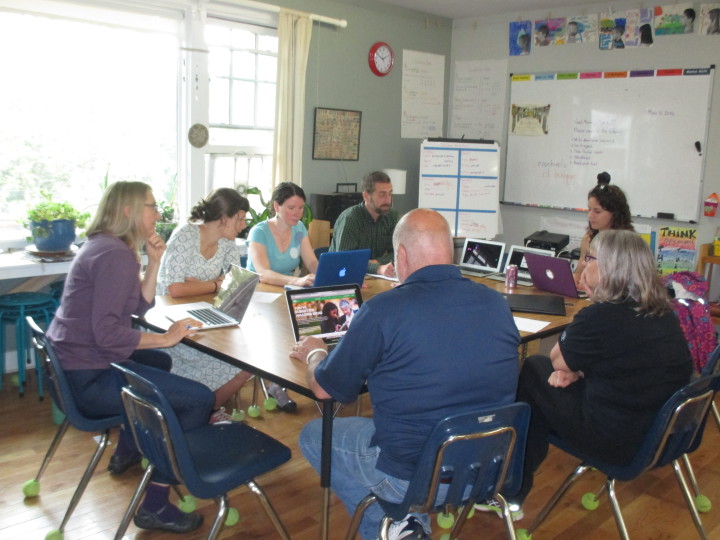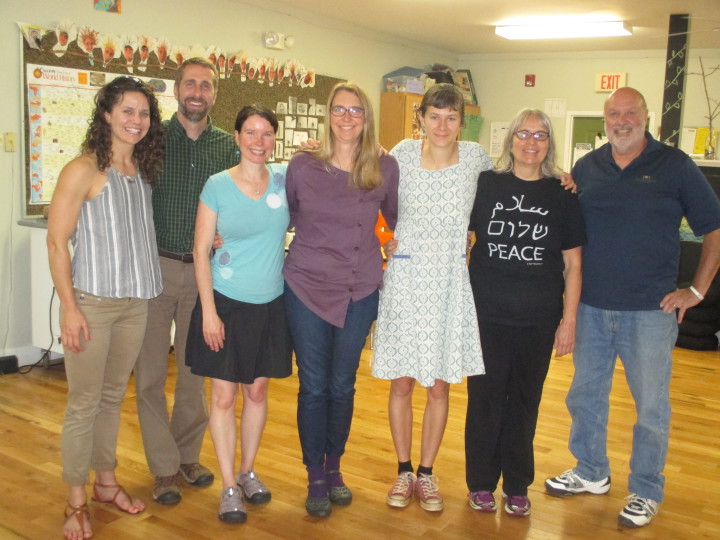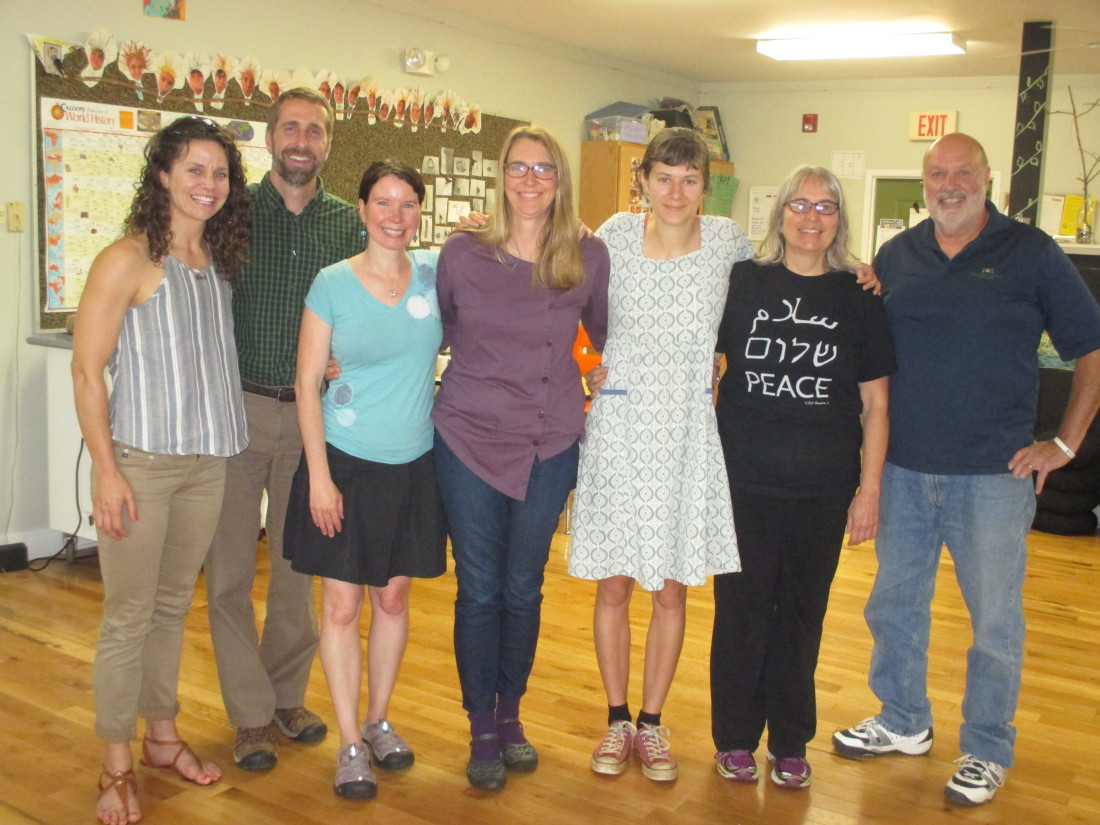What would you do if you were given the chance to reimagine the American high school — and perhaps have your vision made real? The folks at West Asheville’s Rainbow Community School are enthusiastically tackling that ambitious challenge.
Last September, West Willmore, Rainbow’s curriculum director, learned through social media about XQ: The Super School Project, a national competition to reinvent the American high school. Five to 10 winners would each receive a share of a $50 million fund to realize their plans.
“Adding an innovative high school has been part of our strategic plan since the beginning, so you can imagine how excited we were to learn about this,” says Willmore. The private school currently serves grades pre-K through eight.
A project of Laurene Powell Jobs (Steve Jobs’ widow), the campaign is seeking “bold and compelling” proposals, and the sponsors aim to partner with the winners, providing expert support along with the funding.
After winnowing a field of roughly 1,200 applicants down to fewer than 350 semifinalists, XQ asked those still in the running to now reach beyond their own teams, mobilizing community members to provide insights and perspectives concerning 21st-century learners’ needs and the challenges they face. In Rainbow’s case, that meant interviewing more than 45 local educators, community members, potential employers and students.
A public learning network
Enter rEVOLution High — a model that challenges students to understand, not memorize; to focus on asking the right questions, not giving the right answers; to develop as compassionate and thoughtful leaders; to question the status quo; and to take action for change. Designed to be socially just, spiritually fulfilling and environmentally sustainable amid a changing world, the proposed school would offer a curriculum embodying neurology, systems thinking, biomimicry, leadership skills, group facilitation, statistical methods, communication, graphic arts, psychology and more. It’s high-tech with a soft touch.
To come up with a name, Rainbow turned to its own students. Everyone interviewed said that what ultimately motivated them to learn were relationships, particularly with a teacher or other adult who truly loved them. So the spelling is no accident: EVOL (“love” backward) is meant to represent a love of learning while also suggesting the idea of evolution.
Eighth-grader Raven DeGrow said the school should allow “more personal freedom and responsibility,” and classmate Bronwyn White hoped for “less emphasis on test scores and more on personal development.”
rEVOLution High, says Willmore, is envisioned as “a public learning network. Although we will have the bricks and mortar of a traditional school, student learning and development will expand beyond the school walls and into the community through the structure of the learning network and through the redefinition of ‘teacher.’”
Throughout their years in school, students would be attuned to which “intelligences” (modes of functioning and learning) were their strengths and which were their challenges, while working toward enriching all of them.
Having the power to influence their immediate community would be an essential part of these students’ learning experience. Working in “governance circles,” they would help maintain and run the institution. By making informed decisions about both the school’s day-to-day workings and its future direction, the proposal maintains, students would learn best practices for effective social interaction, clarify their own potential roles and responsibilities, and practice balancing the needs of individuals and the whole community.
Hubs, pods, connectors and partners
The center of the learning network would be the “hub,” where students, teachers and other staff would interact. Familylike units called “pods” would give everyone in the network a home base. Within the pods, the diverse students would develop close ties; each one would include at least two adults: a teacher and a “connector.”
Connectors would identify “partners” — adults and organizations in the immediate community and beyond — and serve as liaisons between them and the students. Project teams and individual students would work closely with the partners through internships, special courses or apprenticeships. In both cases, students would be expected to help the partners address their own professional challenges, applying the knowledge and wisdom gained from the core courses and pods to concrete, practical work in the community.
Four-phased learning
The four-year program would encompass four phases of learning — immersion, exploration, creation and implementation — with each phase following the same schedule. In the fall, winter and spring periods, a one-week orientation would be followed by an eight-week learning block of core and elective classes and a three-week “minimester.” A two- to three-week summer learning block would be based on individual student needs, with immersion in the natural world and play as common threads.
Rainbow also plans to collaborate with Ashoka, a network of entrepreneurs who’ve developed successful, innovative solutions to social problems. Last fall, the organization awarded the school a $3,000 grant to get the project off the ground.
To date, Rainbow core team members say they’ve received minimal feedback from XQ. And while they concede that this is a bit unnerving, they’re also intrigued. When Xpress visited the school recently, team members were seated around a table in a fourth-grade classroom, poised to start a three-hour timed test. Although the topic wouldn’t be revealed until the test began, they were ready for action, expecting to use Skype and Google Hangout to connect with whomever they needed to in order to keep Rainbow in the running.

“If we get to the next phase,” says core team member John Bickart, a retired teacher, “we’ll be sending out a challenge to Asheville, asking teachers and business leaders to help us create a diverse platform and get the public involved.”
As of this writing, the team was busy finalizing its second-round application, which was due in late May.
In August, five to 10 winners will get a chance to turn their ideas into reality, and this eager team is hoping to be one of them. In the meantime, they’re gearing up to be catalysts for change.







Before you comment
The comments section is here to provide a platform for civil dialogue on the issues we face together as a local community. Xpress is committed to offering this platform for all voices, but when the tone of the discussion gets nasty or strays off topic, we believe many people choose not to participate. Xpress editors are determined to moderate comments to ensure a constructive interchange is maintained. All comments judged not to be in keeping with the spirit of civil discourse will be removed and repeat violators will be banned. See here for our terms of service. Thank you for being part of this effort to promote respectful discussion.